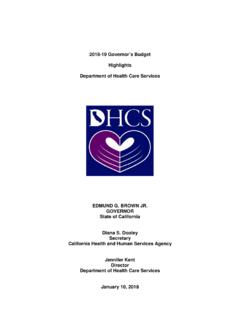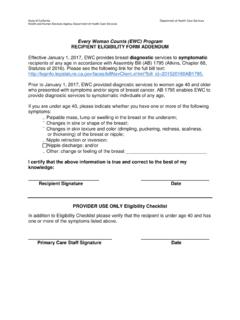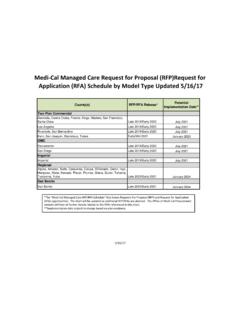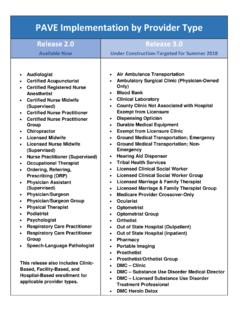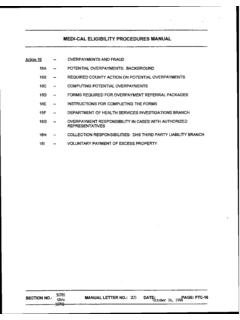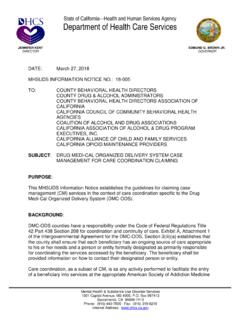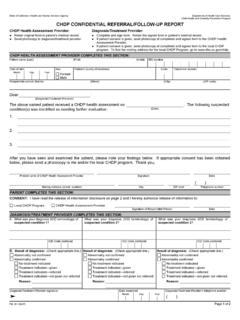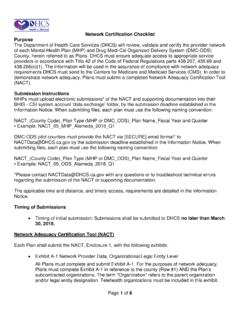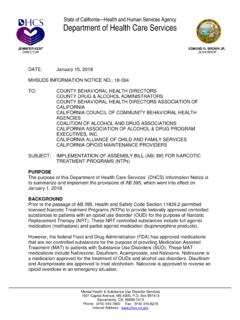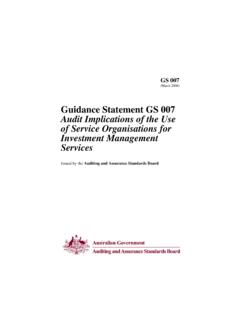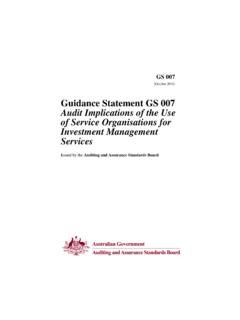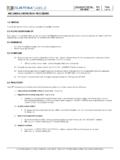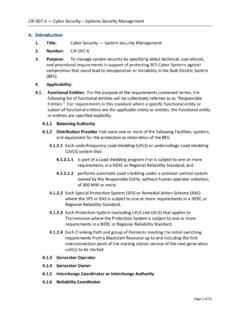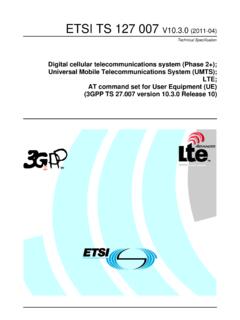Transcription of State of California Health and Human Services Agency
1 State of California Health and Human Services Agency JENNIFER KENT. DIRECTOR EDMUND G. BROWN JR. DIRECTOR. GOVERNOR. JANUARY 25, 2018. ALL COUNTY LETTER (ACL) NO. 18-09. MENTAL Health AND SUBSTANCE USE DISORDER Services (MHSUDS). INFORMATION NOTICE (IN) NO. 18-007. TO: ALL COUNTY WELFARE DIRECTORS. ALL COUNTY FISCAL OFFICERS. ALL COUNTY ADMINISTRATIVE OFFICERS. ALL CHIEF PROBATION OFFICERS. ALL TITLE IV-E AGREEMENT TRIBES. COUNTY WELFARE DIRECTORS ASSOCIATION OF. California . COUNTY BEHAVIORAL Health DIRECTORS. COUNTY BEHAVIORAL Health DIRECTORS. ASSOCIATION OF California . CHIEF PROBATION OFFICERS OF California . COUNTY COUNCIL OF COMMUNITY BEHAVIORAL Health . AGENCIES. SUBJECT: REQUIREMENTS FOR IMPLEMENTING THE CHILD AND. ADOLESCENT NEEDS AND STRENGTHS ASSESSMENT. TOOL WITHIN A CHILD AND FAMILY TEAM. REFERENCE: ASSEMBLY BILL (AB) 403 and AB 1997 (CHAPTER 773, STATUTES OF 2015 and CHAPTER 612, STATUTES OF.)
2 2016); AB 1006 (CHAPTER 714, STATUTES OF 2017);. WELFARE AND INSTITUTIONS CODE , 832, 11400(f), ; ACL NO. 16-84/MHSUDS IN. NO. 16-049; ACL NO. 17- 28; PATHWAYS TO MENTAL Health Services CORE. PRACTICE MODEL GUIDE; COUNTY FISCAL LETTER (CFL) NO. 16-17-22; MHSUDS IN NO. 17-052. ALL COUNTY LETTER NO. 18-09. MHSUDS INFORMATION NO. 18-007. Page Two Pursuant to AB 403 and the Continuum of Care Reform (CCR), the California Department of Social Services (CDSS) has selected the Child and Adolescent Needs and Strengths (CANS) as the functional assessment tool to be used with the Child and Family Team (CFT) process to guide case planning and placement decisions. The Department of Health Care Services (DHCS) has also selected the CANS, as well as the Pediatric Symptom Checklist, to measure child and youth functioning. 1 This ACL/MHSUDS IN provides information and guidance to counties regarding the use of the CANS.
3 The CANS Assessment Tool The CANS is a multi-purpose assessment tool developed to assess well-being, identify a range of social and behavioral healthcare needs, support care coordination and collaborative decision-making, and monitor outcomes of individuals, providers, and systems. Completion of the CANS assessment requires effective engagement using a teaming approach. The CANS must be informed by CFT members, including the youth and family. The CANS. assessment results must be shared, discussed, and used within the CFT. process to support case planning and care coordination. The use and implementation of the CANS by county child welfare, juvenile probation and behavioral Health departments as a mental Health and substance use disorder screening and functional assessment tool advances the efforts already underway through Pathways to Well-Being (previously known as Katie A.)
4 The CANS must be completed prior to the completion of the family case plan, and the CANS results are intended to inform the CFT in several key areas, including but not limited to: Determining if the child, youth, or Non-Minor Dependent (NMD) has unmet behavioral Health or substance use needs;. Making placement decisions;. Informing the Level of Care protocol;. Determining educational needs Identifying any immediate support needs of the family or care provider, such as coaching or respite care; and/or Developing a comprehensive plan to support safety, permanency, and well- being. 1. MHSUDS IN NO. 17-052. ALL COUNTY LETTER NO. 18-09. MHSUDS INFORMATION NO. 18-007. Page Three The CANS assessment results should be used as a shared resource for team members throughout the CFT process. The CANS results provide a platform for the CFT to guide conversations and support the process of learning more about the child, youth, or NMD, and family's needs, as well as identifying behavior patterns.
5 The CDSS has adopted the CANS Early Childhood as the State -approved child welfare assessment tool for children ages birth to five. The 50 Core Items, known as the CANS Core 50, is approved by both CDSS and DHCS as the child welfare and mental Health assessment tool for children ages five to 21. The CANS Core 50 represents the minimum required common items to be used across the State . Counties may opt to add questions specific to their local needs, if desired. Completion of the CANS. Child welfare and juvenile probation departments must provide a CFT to all children, youth, and NMDs in foster care, effective January 1, 2017, as outlined in ACL NO. 16-84/MHSUDS IN. NO. 16-049. A child, youth, or NMD must have an initial CFT meeting as soon as possible, but no later than within 60 days of entering the foster care system, and prior to the development of the case plan, in order to address placement decisions and case planning activities.
6 The CFT meetings inform a child, youth, or NMD, and family-centered case plan, and the case plan articulates specific actions and strategies for achieving the child, youth, or NMD, and family's goals. The CANS is the formal continuous assessment tool used by CANS-certified providers and by certified county staff to inform the case plan goals and serves as the foundation for ensuring the strengths and needs of the child, youth, or NMD, and family members are incorporated into the case plan. Case plan goals are based on identified, actionable items and focused on addressing the needs for child, youth and NMD. permanency, safety, and well-being. In addition, the case plan must include compliance with any relevant court orders. Children, youth and NMD's receiving specialty mental Health Services are assessed by CANS certified providers and certified county staff using the CANS.
7 Every 6 months. County placing agencies and county Mental Health Plans (MHPs) are jointly responsible for ensuring that a single CANS tool is completed for each child, youth and NMD. As such, county placing agencies and MHPs must share with each other completed CANS assessments and their resulting identified outcomes for children assessed and/or served by both agencies to avoid unnecessary duplication and over-assessment of children, youth, and NMDs. ALL COUNTY LETTER NO. 18-09. MHSUDS INFORMATION NO. 18-007. Page Four If a current CANS assessment has been completed by a county MHP or their contracted provider, the CFT must use it. The placing Agency is not required to conduct a new CANS, but should consider whether any updates to the CANS. ratings are appropriate. Similarly, if a current CANS assessment is completed by or on behalf of the placing Agency , the MHP must use it.
8 In this case, the MHP is not required to complete a new CANS but should consider whether any updates to the CANS ratings are appropriate. For children, youth, or NMDs who are already in foster care and are not currently receiving specialty mental Health Services , the CANS tool functions as the required mental Health If the screening indicates there may be a mental Health need for specialty mental Health Services , the placing Agency shall make a referral to the county MHP. The MHP must accept the completed CANS assessment and not complete a new CANS assessment, but may consider whether any updates to the CANS ratings are appropriate. The placing Agency must document the screening and referral to the MHP in the Child Welfare Services /Case Management System (CWS/CMS). A CFT meeting to discuss the results of the CANS should also occur to support case planning and service coordination.
9 The CDSS will issue a subsequent policy letter that will provide further guidance around operationalizing the CANS and integration of the CANS within the CFT process. Confidentiality Appropriate and effective confidentiality and information sharing practices are key components of the CFT process. Therefore, the CFT process must be designed to protect children, youth, NMDs, and families' rights to privacy without creating barriers to coordinating care and receiving Services . Welfare and Institutions Code Section 832 authorizes information sharing between CFT members relevant to case planning and necessary for providing Services and supports to the child, youth, or NMD, and family and requires the execution of appropriate authorizations to share such information. A person designated as a member of a CFT may receive and disclose relevant information and records within the CFT, subject to the child, youth, or NMD, and/or their parent or guardian signing an authorization to release information, as required depending on the type of information.
10 The CDSS and DHCS have developed a universal release of information form to be used by the CFT. The form which is attached to this letter and titled Child and Family Team Authorization for Use of Protected Health 2 Katie A. v. Bonta, et al.; All County Letter 15-11. ALL COUNTY LETTER NO. 18-09. MHSUDS INFORMATION NO. 18-007. Page Five and Private Information, will allow for sharing of information bet ween CFT. members pursuant to Welfare and Institution Code 832. County placing agencies and county MHPs must share CANS assessments for children, youth and NMDs assessed and/or served by either system and completion of a universal information release form shall not be required for this purpose. This is critical to ensure that children and youth are not subject to multiple assessments, and to promote consistent information across agencies.
